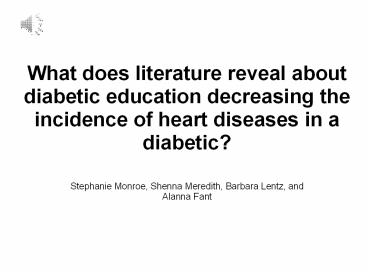Stephanie Monroe, Shenna Meredith, Barbara Lentz, and Alanna Fant
1 / 16
Title:
Stephanie Monroe, Shenna Meredith, Barbara Lentz, and Alanna Fant
Description:
What does literature reveal about diabetic education decreasing the incidence of heart diseases in a diabetic? Stephanie Monroe, Shenna Meredith, Barbara Lentz, and ... –
Number of Views:140
Avg rating:3.0/5.0
Title: Stephanie Monroe, Shenna Meredith, Barbara Lentz, and Alanna Fant
1
What does literature reveal about diabetic
education decreasing the incidence of heart
diseases in a diabetic?
- Stephanie Monroe, Shenna Meredith, Barbara Lentz,
and Alanna Fant
2
Introduction
- There is a high correlation between diabetes and
heart disease. If we can prove that an increase
in diabetic management education reduces the
incidence of heart disease in diabetics, we can
indicate the need for increased use in hospitals
and outpatient diabetics.
3
Article 1
- Patients who monitored blood glucose for six
months decreased HbA1c levels and risk for
coronary heart disease (CHD) - Hba1c levels went from 9.2 to 7.3 in six months
- Risk for CHD nearly cut in half
4
Article 1 Analysis
- Problem / Purpose statement
- -Clean and concise
- -Included variables, population and is
empirically testable - Population
- - Afro-Caribbean diabetic women
- Limitations
- -Small sample size
- -Population selected were motivated individuals
- -Medication and lifestyle of individuals was not
factored into the study
5
Article 1 Analysis
- Research Design
- - Time series design
- Measurement tools
- -UKPDS risk engine
- -Glucose monitors.
- Results
- -HbA1c levels of the intervention group decreased
- -Intervention groups 10 year risk for CHD
decreased
6
Article 2
- The patients who were given extensive education
and consultation on Diabetes management suffered - 25 less MI
- 50 less strokes
- 30 less Open Heart Bypass and Stent Placement
- 50 less non fatal cardiovascular events
- 15 less deaths
7
Article 2 Analysis
- Strength in Evidence
- Decrease in all risk factors of cardiovascular
progression - Eight year follow up study
8
- Weakness in Evidence
- Small sample size
- Glucose lowering therapy not presented
- Assessment bias of both intervention and data
collection done by same researchers (consultants)
9
Nursing Experience ofDiabetes Education on Heart
Unit and Recommendation
- Lacking in Diabetic Education
- Education done by Diabetic Educator
- More emphasis on Cardiovascular Medication
- More emphasis on smoking cessation
- Recommend to increase education in patient with
Type 2 Diabetes
10
Article 3
- Patients were evaluated on knowledge retention 18
months after care - One group received standard follow up other group
received intensive nurse-led education - No difference in knowledge retention was shown in
the two groups - Education should be tailored to each individual
11
Article 3 Analysis
- Posttest only design
- No other tools to validate questionnaire
- Self-reporting
- No way to verify accuracy of answers
- Additional studies needed
- No Theory or Conceptual basis discussed
- Problem and purpose clearly stated
- Population Clearly defined
12
Recommendations
- Bridge between acute and preventative care
- Tailor education to individual
13
Article 4
- Effects of a diabetic self-management program on
glycemic control, coronary heart disease (CHD)
risk, and quality of life (QOL) among Thai
patients with type 2 diabetes - HbA1c mean levels decreased from 8.08 to 7.40
for the experimental group vs 8.09 to 8.02 for
the control group - The experimental group had a decrease in CHD risk
factors, including total cholesterol,
triglycerides, LDL levels, diastolic BP, and BMI
and had a higher increase in HDL-C levels when
compared to the control group - Experimental group exhibited greater increase in
QOL than control group
14
Article 4 Analysis
- Hypothesis
- Diabetic patients receiving a self-management
program would have lower levels of HbA1c and CHD
risk, and a better QOL than those receiving the
usual nursing care. - Population
- Thai patients with type 2 diabetes
- Over 35 years of age
- Fasting plasma glucose level gt140mg for at least
2 follow-up visits - Were able to speak, read, and write in Thai
- Limitations
- Small sample size
- Single geographical area
15
- Article 4 Analysis
- Research Design
- Randomized controlled trial
- Measurement Tools
- Blood Samples before and after
- Quality of life questionnaire
- Coronary heart disease risk profile
- Results
- Decrease HbA1c
- Dereased Coronary Heart Disease Risk
- Increased Quality of life
16
Conclusion
- Overall reduction in risk and improvement of
quality of life - Long term education
- Education needs to occur in both the acute and
primary care settings








![READ⚡[PDF]✔ Any angel has the right to live twice: Marilyn Monroe art and beauty Magazine.](https://s3.amazonaws.com/images.powershow.com/10077745.th0.jpg?_=20240712019)






















